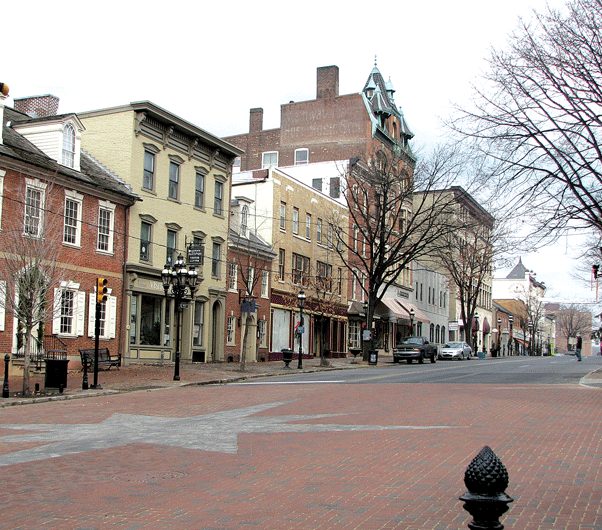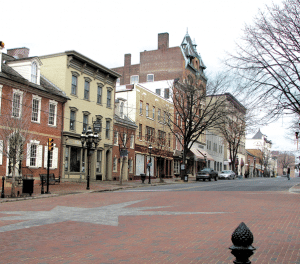
How the Sands Casino Changed the Landscape — and How It Didn’t
City2City

By most accounts, the Sands casino has neither helped nor hurt businesses in the historic center of the city.
He told BusinessWest that he probably filed more than 100 stories on the broad topic over the next several years, including a few involving a community roughly 1,500 miles to the west.
That would be Council Bluffs, Iowa, where three casinos had opened over the previous few years.
Assad visited that community of 63,000 people to gain some perspective on what happens when a casino opens its doors, with regard to everything from business to crime to the character of the city in question. Summing up what he learned rather quickly, and in no particular order, he said there was no prostitution (at least that anyone knew of), no mob figures patrolling the casino floors, no huge impact (good or bad) on existing business, some problems with gambling addiction, and, overall, few people with many bad things to say about the arrival of organized gaming.
And seven years later, he says that essentially the same things have happened, or not happened, as the case may be, in Bethlehem and surrounding communities.
That was the gist of the message he left with the City2City delegation from Greater Springfield that visited the Sands Casino Resort Bethlehem late last month. In fact, as he addressed that group, he apologized (sort of) to the man sitting two seats down from him at the head table, Robert DeSalvio, president of the casino, before noting, “if you didn’t come to Bethlehem to visit the casino, you probably wouldn’t even know it’s here. And I guess that’s a good thing.”
In a later interview with BusinessWest, Assad said there has been an increase in crime, but about what would be expected from any enterprise that brings 20,000 people into a community each day, be it a casino or a shopping mall or an amusement park. And there have been some unexpected problems, such as the need for the county’s court system to hire employees who can speak Mandarin and Cantonese — spending necessitated by mostly minor crimes committed by the thousands of Asians who come to the casino from the New York metropolitan area, only 85 miles to the northeast, every day.
But overall, Assad wore out the phrase ‘neutral’ to describe the overall affect of the complex at 77 Sands Blvd.
“It hasn’t been as beneficial as the advocates said it would be,” he said. “And it hasn’t been as bad as the naysayers predicted.”
Assad told BusinessWest that, while there were never any guarantees that a casino license would be awarded to Lehigh County, it was generally believed that the region’s close proximity to New York and New Jersey and what he would call in one of his stories the “Asian invasion” — it is a shorter ride from those areas to Bethlehem than it is to either Atlantic City or Central Connecticut (Foxwoods and Mohegan Sun) — would make it an attractive option for casino operators.
And eventually there were several proposals for that area, including one in Allentown and two in Bethlehem, he said, adding that one of the plans for the latter, a greenfield proposal, never gained a strong measure of support from city officials.
This then left Allentown pitted against Bethlehem and a proposal for the old steel mill there, in what he described as a fairly bitter contest.
“Allentown and Bethlehem … there’s quite a bit of tension between them because the mayors don’t like each other at all,” said Assad. “And the mayor of Allentown’s contention all along was that Allentown needs this more than Bethlehem.”
That argument didn’t prevail at the state level, he went on, adding that, perhaps in an effort to ease all that tension, a revenue-sharing agreement between those communities and a few others was worked out. It’s a strategy he believes Western Mass. leaders should attempt to replicate.
Looking back, Assad said there was both support for a casino in Bethlehem and opposition, primarily from the large and vocal Moravian community. And while there were fears about crime, prostitution, and problem gambling, perhaps the biggest concern was that the city would lose its character, he noted.
“People thought that Bethlehem had found its niche in historic preservation, tourism — it was the Christmas City,” he said. “The city had kept to its roots of sort of being that quaint, historic town, and many felt it didn’t have to do anything as unseemly as a casino.”
As things have worked out, that reputation has not been compromised, he went on, adding that, in his opinion, Bethlehem hasn’t become a casino town — it’s simply a community with a quaint downtown and a huge piece of American industrial history just a few blocks away, that also has a casino.
Meanwhile, that casino’s operators have collaborated with the city and several nonprofit agencies to bring additional development of the massive former Bethlehem Steel plant, which had lay mostly dormant for many years after it ceased all operations in 1995, said Assad, noting that the casino has, in some ways, been a force in economic development.
It has not, however, been any real help to existing businesses, especially in the area around it, what’s known as South Bethlehem.
Indeed, while those who don’t come to Bethlehem for the casino might not know it’s there, the great majority of those who do come for it don’t see anything else, said Assad, adding that revamped traffic patterns make it all too easy to get into the casino and then back on the highway and home.
“Most people who go to the casino never see Bethlehem in daylight,” he explained. “They come in their car, they get out of the car in the parking garage, they do their thing, and then they leave again. They never really see any of Bethlehem.”
Still, the casino has a huge overall economic impact, he told BusinessWest, noting the $9 million in real-estate taxes and that $19 million host fee paid annually.
These numbers, along with the related developments at the steel site, the revenue-sharing agreement, and the few negative effects on surrounding communities, lead Assad to conclude that the Sands is probably the most successful casino operation in Pennsylvania, for all parties involved
He advises Western Mass. leaders to take what they can from that experience, but above all, to understand the huge stakes involved, short and long term, and “get it right.”
— George O’Brien






